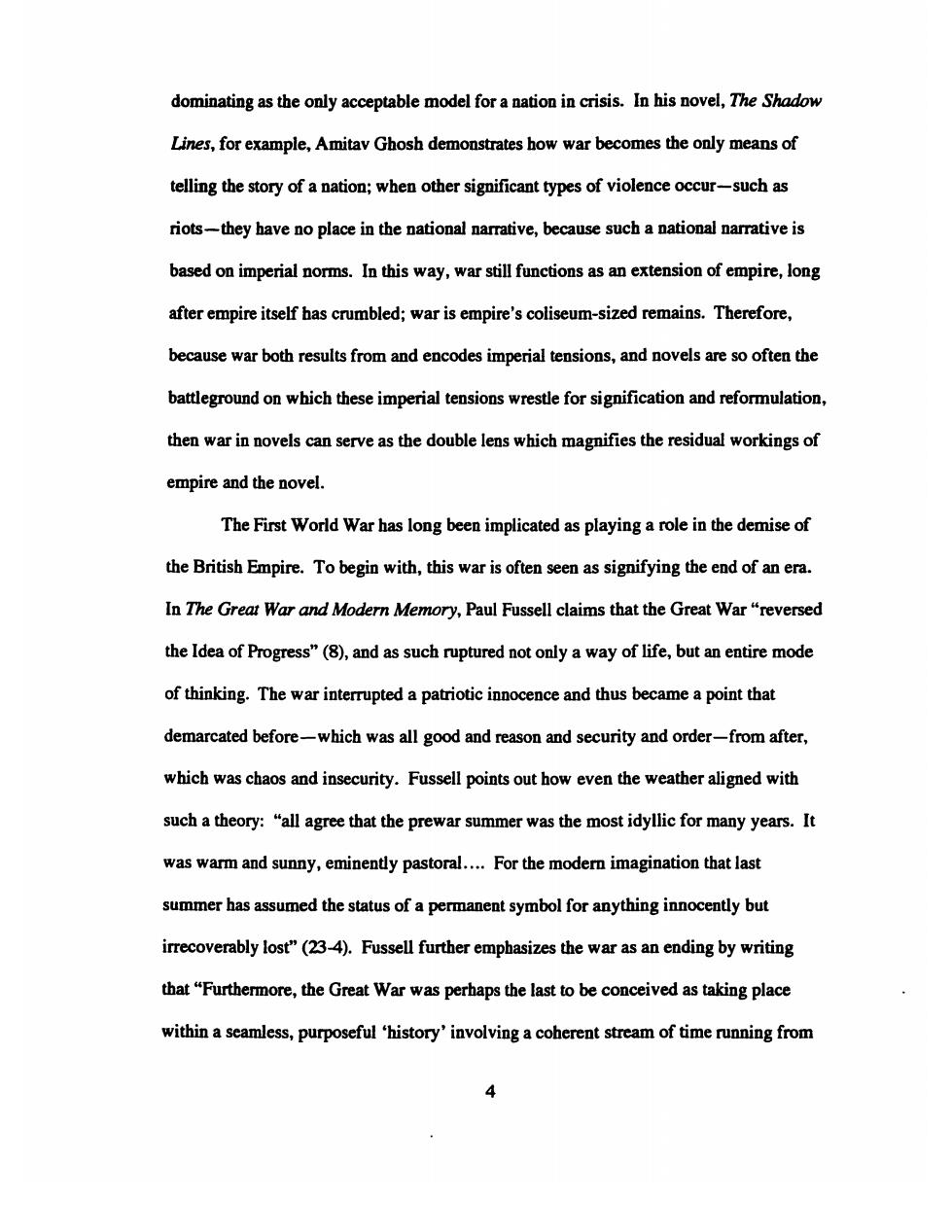
dominating as the only acceptable model for a nation in crisis.In his novel,The Shadow Lines,for example,Amitav Ghosh demonstrates how war becomes the only means of telling the story of a nation;when other significant types of violence occur-such as riots-they have no place in the national narrative,because such a national narrative is based on imperial norms.In this way,war still functions as an extension of empire,long after empire itself has crumbled;war is empire's coliseum-sized remains.Therefore, because war both results from and encodes imperial tensions,and novels are so often the battleground on which these imperial tensions wrestle for signification and reformulation, then war in novels can serve as the double lens which magnifies the residual workings of empire and the novel. The First World War has long been implicated as playing a role in the demise of the British Empire.To begin with,this war is often seen as signifying the end of an era. In The Great War and Modern Memory,Paul Fussell claims that the Great War"reversed the Idea of Progress"(8),and as such ruptured not only a way of life,but an entire mode of thinking.The war interrupted a patriotic innocence and thus became a point that demarcated before-which was all good and reason and security and order-from after, which was chaos and insecurity.Fussell points out how even the weather aligned with such a theory:"all agree that the prewar summer was the most idyllic for many years.It was warm and sunny,eminently pastoral....For the modern imagination that last summer has assumed the status of a permanent symbol for anything innocently but irrecoverably lost"(23-4).Fussell further emphasizes the war as an ending by writing that "Furthermore,the Great War was perhaps the last to be conceived as taking place within a seamless,purposeful 'history'involving a coherent stream of time running from
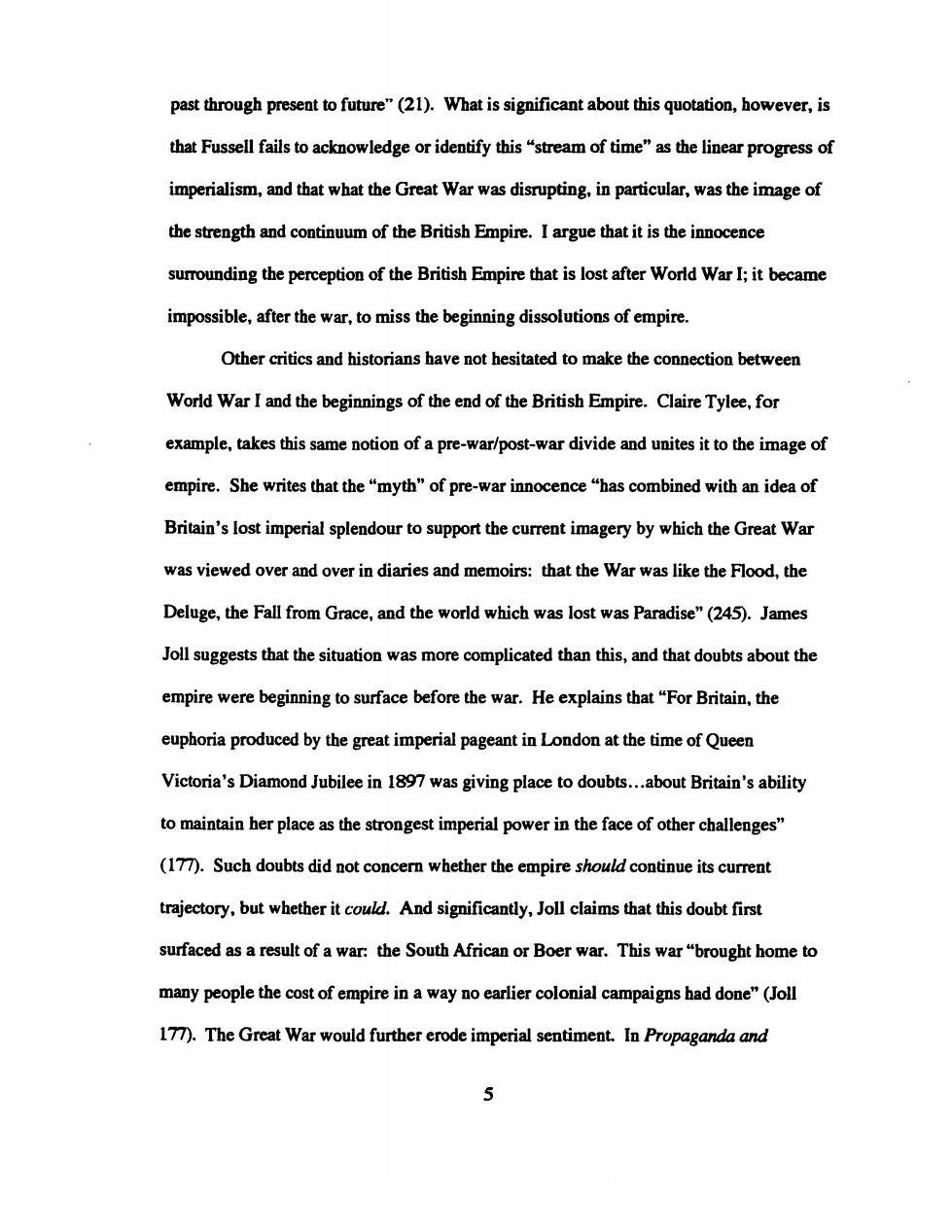
past through present to future"(21).What is significant about this quotation,however,is that Fussell fails to acknowledge or identify this"stream of time"as the linear progress of imperialism,and that what the Great War was disrupting,in particular,was the image of the strength and continuum of the British Empire.I argue that it is the innocence surrounding the perception of the British Empire that is lost after World War I;it became impossible,after the war,to miss the beginning dissolutions of empire. Other critics and historians have not hesitated to make the connection between World War I and the beginnings of the end of the British Empire.Claire Tylee,for example,takes this same notion of a pre-war/post-war divide and unites it to the image of empire.She writes that the "myth"of pre-war innocence"has combined with an idea of Britain's lost imperial splendour to support the current imagery by which the Great War was viewed over and over in diaries and memoirs:that the War was like the Flood,the Deluge,the Fall from Grace,and the world which was lost was Paradise"(245).James Joll suggests that the situation was more complicated than this,and that doubts about the empire were beginning to surface before the war.He explains that "For Britain,the euphoria produced by the great imperial pageant in London at the time of Queen Victoria's Diamond Jubilee in 1897 was giving place to doubts...about Britain's ability to maintain her place as the strongest imperial power in the face of other challenges" (177).Such doubts did not concern whether the empire should continue its current trajectory,but whether it could.And significantly,Joll claims that this doubt first surfaced as a result of a war:the South African or Boer war.This war "brought home to many people the cost of empire in a way no earlier colonial campaigns had done"(Joll 177).The Great War would further erode imperial sentiment.In Propaganda and 5
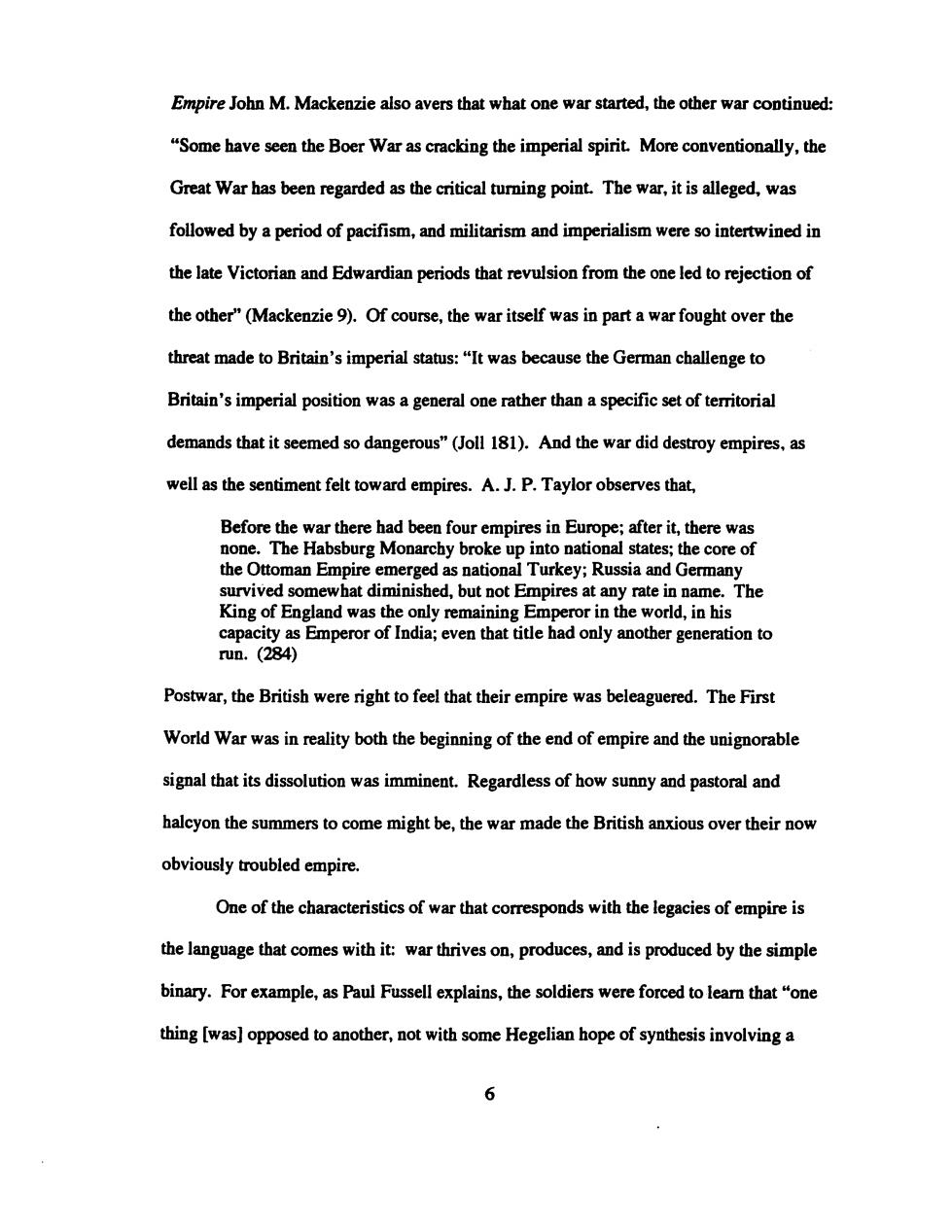
Empire John M.Mackenzie also avers that what one war started,the other war continued: "Some have seen the Boer War as cracking the imperial spirit.More conventionally,the Great War has been regarded as the critical turning point.The war,it is alleged,was followed by a period of pacifism,and militarism and imperialism were so intertwined in the late Victorian and Edwardian periods that revulsion from the one led to rejection of the other"(Mackenzie 9).Of course,the war itself was in part a war fought over the threat made to Britain's imperial status:"It was because the German challenge to Britain's imperial position was a general one rather than a specific set of territorial demands that it seemed so dangerous"(Joll 181).And the war did destroy empires,as well as the sentiment felt toward empires.A.J.P.Taylor observes that, Before the war there had been four empires in Europe;after it,there was none.The Habsburg Monarchy broke up into national states;the core of the Ottoman Empire emerged as national Turkey;Russia and Germany survived somewhat diminished,but not Empires at any rate in name.The King of England was the only remaining Emperor in the world,in his capacity as Emperor of India;even that title had only another generation to un.(284) Postwar,the British were right to feel that their empire was beleaguered.The First World War was in reality both the beginning of the end of empire and the unignorable signal that its dissolution was imminent.Regardless of how sunny and pastoral and halcyon the summers to come might be,the war made the British anxious over their now obviously troubled empire. One of the characteristics of war that corresponds with the legacies of empire is the language that comes with it:war thrives on,produces,and is produced by the simple binary.For example,as Paul Fussell explains,the soldiers were forced to learn that"one thing [was]opposed to another,not with some Hegelian hope of synthesis involving a 6
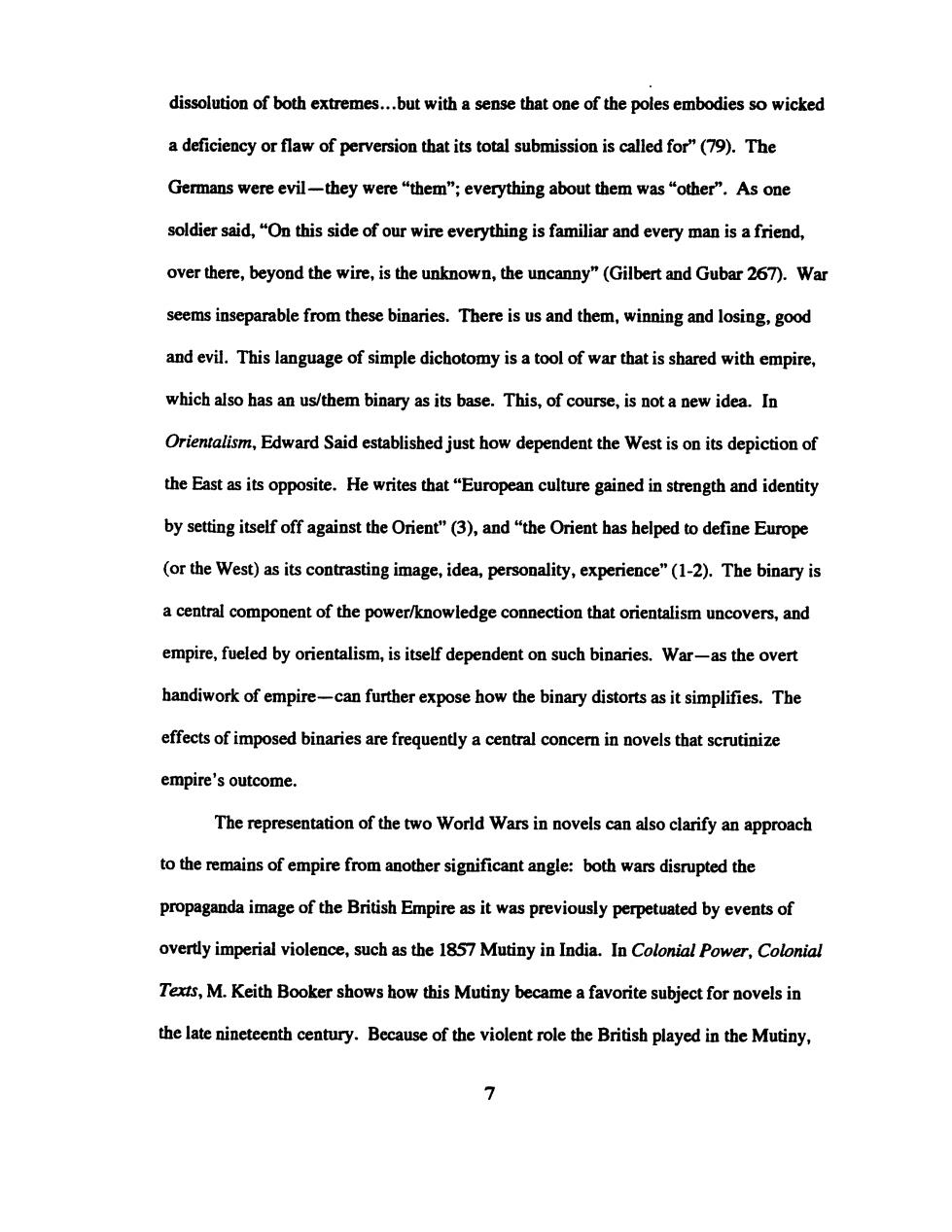
dissolution of both extremes...but with a sense that one of the poles embodies so wicked a deficiency or flaw of perversion that its total submission is called for"(79).The Germans were evil-they were“them”;everything about them was“other”.As one soldier said,"On this side of our wire everything is familiar and every man is a friend, over there,beyond the wire,is the unknown,the uncanny"(Gilbert and Gubar 267).War seems inseparable from these binaries.There is us and them,winning and losing,good and evil.This language of simple dichotomy is a tool of war that is shared with empire, which also has an us/them binary as its base.This,of course,is not a new idea.In Orientalism,Edward Said established just how dependent the West is on its depiction of the East as its opposite.He writes that"European culture gained in strength and identity by setting itself off against the Orient"(3),and"the Orient has helped to define Europe (or the West)as its contrasting image,idea,personality,experience"(1-2).The binary is a central component of the power/knowledge connection that orientalism uncovers,and empire,fueled by orientalism,is itself dependent on such binaries.War-as the overt handiwork of empire-can further expose how the binary distorts as it simplifies.The effects of imposed binaries are frequently a central concern in novels that scrutinize empire's outcome. The representation of the two World Wars in novels can also clarify an approach to the remains of empire from another significant angle:both wars disrupted the propaganda image of the British Empire as it was previously perpetuated by events of overtly imperial violence,such as the 1857 Mutiny in India.In Colonial Power,Colonial Texts,M.Keith Booker shows how this Mutiny became a favorite subject for novels in the late nineteenth century.Because of the violent role the British played in the Mutiny
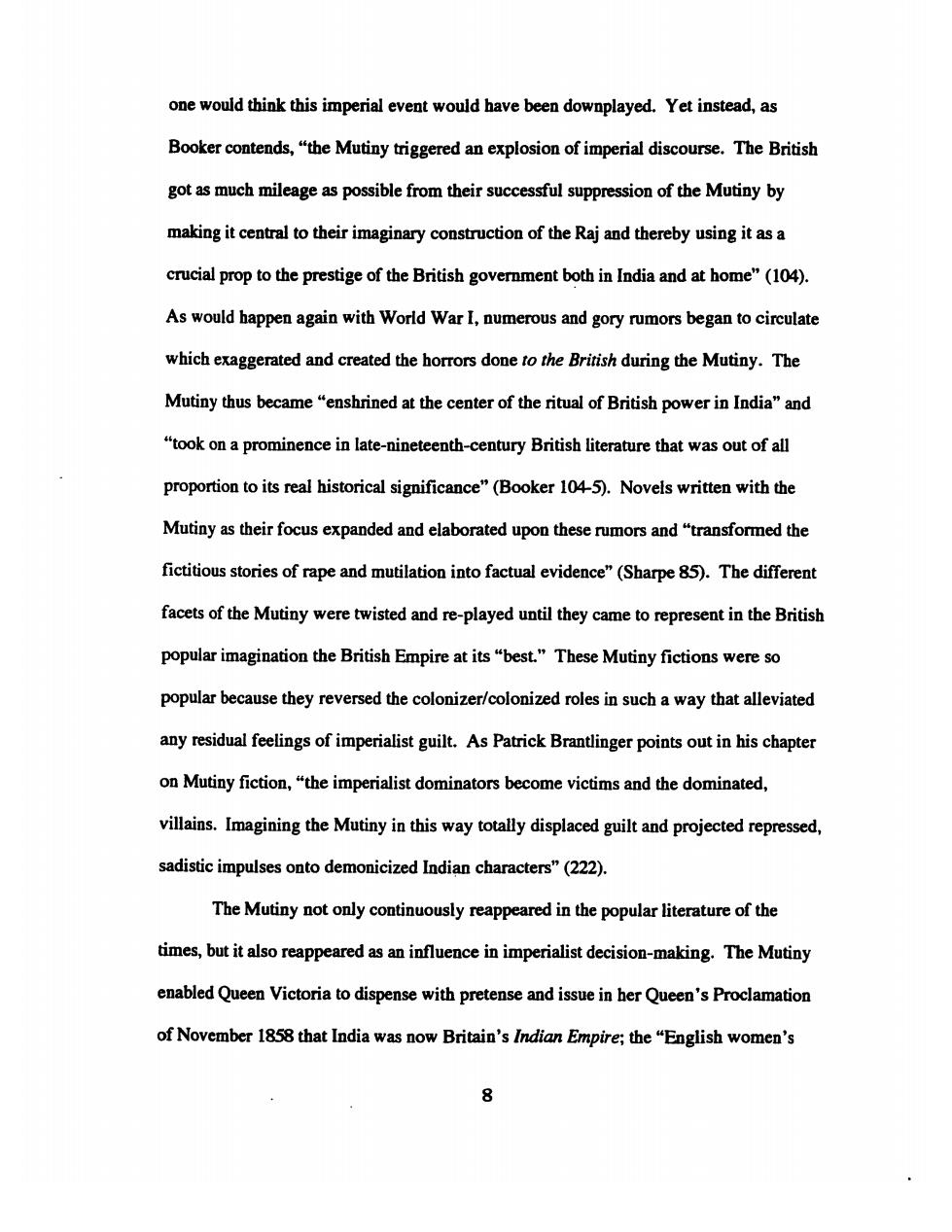
one would think this imperial event would have been downplayed.Yet instead,as Booker contends,"the Mutiny triggered an explosion of imperial discourse.The British got as much mileage as possible from their successful suppression of the Mutiny by making it central to their imaginary construction of the Raj and thereby using it as a crucial prop to the prestige of the British government both in India and at home"(104). As would happen again with World War I,numerous and gory rumors began to circulate which exaggerated and created the horrors done to the British during the Mutiny.The Mutiny thus became"enshrined at the center of the ritual of British power in India"and "took on a prominence in late-nineteenth-century British literature that was out of all proportion to its real historical significance"(Booker 104-5).Novels written with the Mutiny as their focus expanded and elaborated upon these rumors and "transformed the fictitious stories of rape and mutilation into factual evidence"(Sharpe 85).The different facets of the Mutiny were twisted and re-played until they came to represent in the British popular imagination the British Empire at its"best."These Mutiny fictions were so popular because they reversed the colonizer/colonized roles in such a way that alleviated any residual feelings of imperialist guilt.As Patrick Brantlinger points out in his chapter on Mutiny fiction,"the imperialist dominators become victims and the dominated, villains.Imagining the Mutiny in this way totally displaced guilt and projected repressed, sadistic impulses onto demonicized Indian characters"(222). The Mutiny not only continuously reappeared in the popular literature of the times,but it also reappeared as an influence in imperialist decision-making.The Mutiny enabled Queen Victoria to dispense with pretense and issue in her Queen's Proclamation of November 1858 that India was now Britain's Indian Empire;the "English women's 8